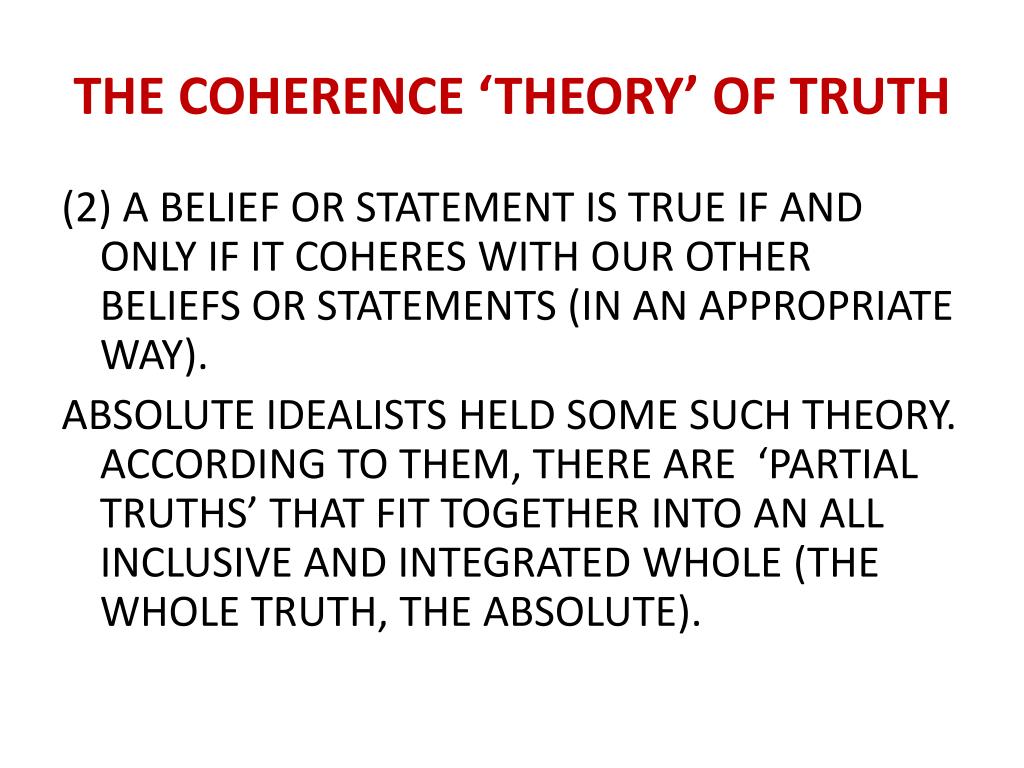
Even in the mind of a single subject, consistency of beliefs is more demanding than coherence, but neither is very likely.Ĭoherence and consistency are best understood as desirable conditions for any theory of truth, including the correspondence theory of truth. In a system of belief as large as the culture of a society, there are many conflicting beliefs. But consistency is only possible for relatively modest logical and mathematical systems. The coherence theory is close to the consistency theory of truth. The correspondence theory says that a belief is true when it corresponds with what is 'out there' in the real world. In this case, coherence is one way to justify a belief. The coherence theory says that a belief is true when it fits with our other beliefs and meanings. In traditional epistemology, the coherence may be internal to a personal set of beliefs that are accessible to a subject. In analytic language philosophy, the truth of a proposition depends on its agreement with some larger set of propositions, ideally all known true propositions and any logical inferences from those propositions. Charles Sanders Peirce's theory of pragmatic truth is the coherent inter-subjective agreement of an open community of inquirers. Perfect coherence is not to be expected, of course. In scientific theories, every new observational fact must be integrated with existing facts to make them maximally coherent. In philosophies of idealism, all the ideas or beliefs are said to cohere with one another, perhaps because the world is reason itself or created by a rational agent.
COHERENCE THEORY OF TRUTH IN PHILOSOPHY FREE
Handbook of Life Course Health DevelopmentĪFMC Primer on Population Health – A virtual textbook on Public Health concepts for clinicians.Adolphe Quételet Jürgen Renn Juan Roederer Jerome Rothstein David Ruelle Tilman Sauerīiosemiotics Free Will Mental Causation James SymposiumĪ coherence theory bases the truth of a belief on the degree to which it coheres ("hangs together") with all the other beliefs in a system of beliefs (typically one person's beliefs, but it could be any body of knowledge). Source: ‘ What is Good? What is Bad? The Value of All Values across Time, Place and Theories’ by John McMurtry, Philosophy and World Problems, Volume I-III, UNESCO in partnership with Encyclopedia of Life Support Systems: Oxford, 2004-11. While religions have featured the animating breath of life, they have attributed it to a transcendental creator so as to overlook its source in the creation itself–a kind of idolatry of man-made ideas. The totality of conditions presupposed by the life of individual living things the basis of there being value and beings that can value. The universal basis of all value, the maximal development of the capabilities of living things relative to their degree of organic and social complexity. The life-ground is to be distinguished from the concept of “the life-world” which refers to background beliefs.

Axiologically understood, all the life support systems required for human life to reproduce or develop. Coherence as a theory of truth claims that truth can be defined as coherence, i.e., a belief is true if and only if it coheres with other beliefs. When coherence theorists say that every statement is only partly true, they usually seem to mean that every statement is only part of the truth, since nothing. Most simply expressed, all the conditions required to take your next breath. Perspectives on the Philosophy of Donald Davidson. Donald Davidson - 1986 - In Ernest LePore (ed.), Truth and Interpretation. A coherence theory of truth and knowledge. Linda Sharon Alcoff - 1988 - Dissertation, Brown University. The Life-Ground: the conditions of all life and substantive value. New Versions of the Coherence Theory: Gadamer, Davidson, Foucault, and Putnam.

The Life-Ground of Value: A concept introduced by McMurtry (1998)which signifies the totality of conditions, natural and/or social, upon which any living thing or collection of living things depends for its existence.


 0 kommentar(er)
0 kommentar(er)
